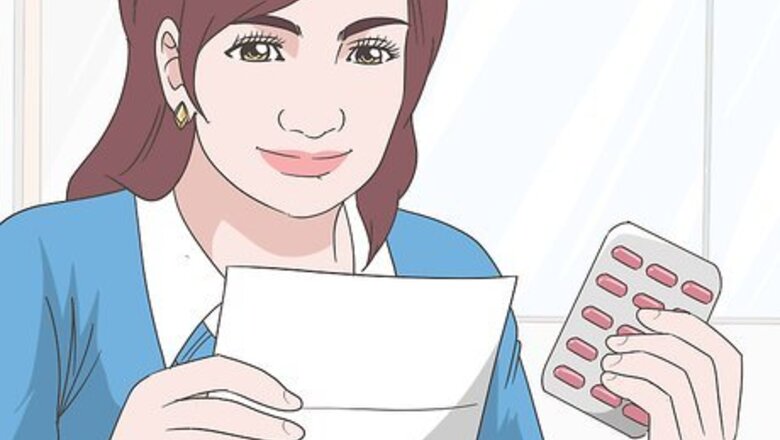
views
X
Trustworthy Source
Mayo Clinic
Educational website from one of the world's leading hospitals
Go to source
While it takes extra time to prepare for a colonoscopy, it’ll help you have a smooth, easy procedure on the day of your exam.
Making Arrangements
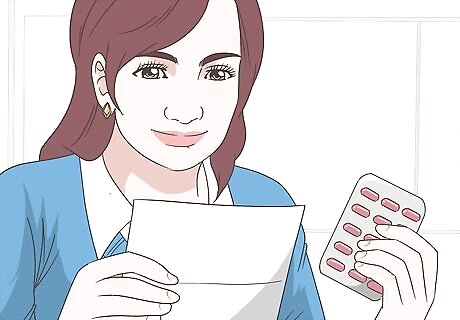
Pick up the procedure prep instructions from your doctor a week before. You may need to adjust your medications, so it's important to get your instructions early. Follow your doctor's instructions exactly so you don’t have to reschedule or repeat the exam. While you're getting your instructions, confirm the date and time of your colonoscopy so you know when to arrive. Read your instructions as soon as you get them so you can ask questions, get necessary supplies, and can follow the recommended timeline. Keep in mind that you may need to start your preparations as much as a week in advance.
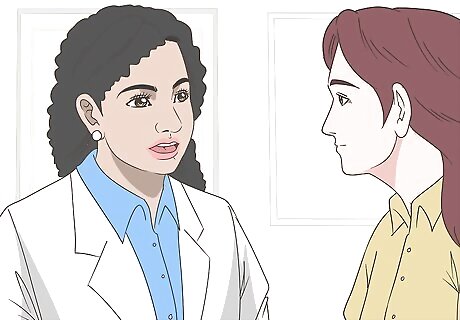
Discuss any questions and concerns you have with your doctor. It’s normal to feel a little nervous before a medical exam. Your doctor can help put your mind at ease by answering your questions and telling you exactly what to expect. Bring any questions you have with you to your appointment, and call your doctor’s office if you think of any new questions. For instance, you might ask questions like, “How long will it take to get my results?” “When should I eat my last meal before the exam?” and “What will the scope feel like?” You may need to stop taking some medications 7 days before your colonoscopy. For instance, medications for diabetes, heart problems, and high blood pressure may affect your results. You may also need to stop taking certain supplements, like fish oil, at least 2 days before your exam.
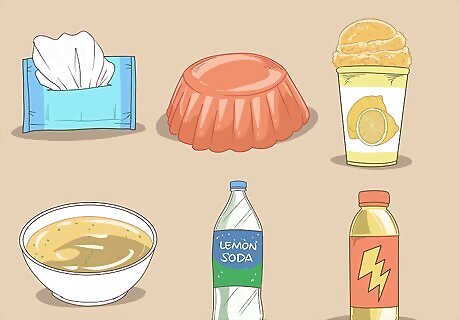
Stock your pantry and bathroom with helpful supplies. Sticking to your preparation plan will be easier and more enjoyable if you have a variety of approved choices for your liquid diet. Additionally, you might like to have items like toilet wipes or flavoring for when you use your laxative. Other useful supplies you might want to stock up on include: Wet wipes to yourself after using your laxative Broth Jello Italian ice or popsicles Coffee, tea, clear soda, or sports drinks (not red, purple, or blue) Crystal Light or Kool-Aid mix to flavor a liquid laxative (not red, purple, or blue)
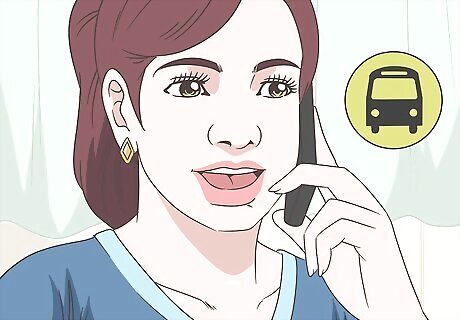
Arrange a ride home from the procedure since you'll be sedated. Fortunately, your doctor will give you an intravenous (IV) anesthetic that contains a sedative and pain killers before your colonoscopy so you’ll be comfortable. However, this means you won’t be able to drive yourself home. Ask someone to accompany you or to pick you up after the procedure. If you’re having trouble getting a ride, you might arrange for a ride-sharing service to pick you up.
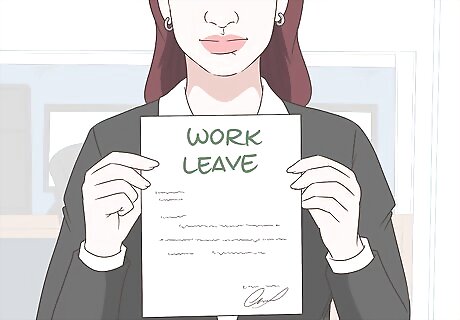
Take the day off of work so you can rest and recover. You won’t be able to go back to work after your colonoscopy, so request the entire day off. You’ll likely still feel the effects of the anesthesia, and you may feel tired from skipping meals. It’s best to give yourself time to rest and recover. You should be able to go back to work the next day, but check with your doctor to be sure.
Emptying Your Colon
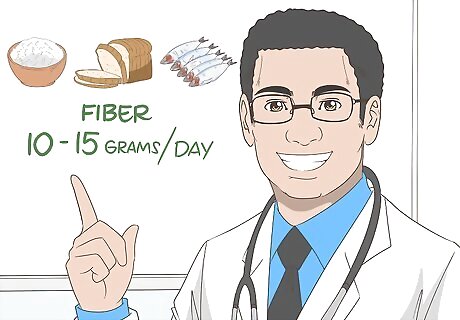
Switch to a low-fiber diet 3 days before your exam. Fiber bulks up your stools, which is normally good. However, your colon needs to be totally empty to have a colonoscopy, so you want your stools to be loose. To help you have easy bowel movements, temporarily cut out high-fiber foods like whole grains, raw fruits and vegetables, dried fruit, nuts, and seeds. Ask your doctor how much fiber you should eat. Track your fiber by writing down how much you’re eating or by entering what you eat into a nutrition app. It might help to prepare yourself a week in advance by decreasing the amount of fiber you eat and increasing foods that promote colon health, like prunes and prune juice, berries, and dark, leafy greens.
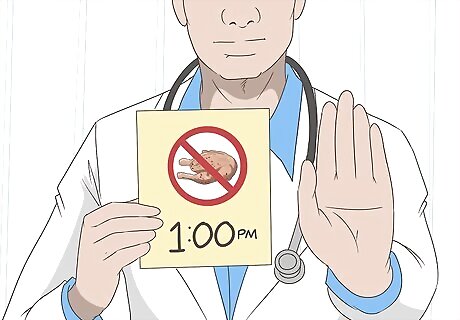
Stop eating solid food 24 hours before your colonoscopy. Eating too close to your exam may make it hard for you to have a clean colon, which can affect your results. Talk to your doctor to find out the cut-off time for your last meal prior to the exam. Don’t eat after your cut-off time. Otherwise, your doctor may cancel or reschedule your procedure.
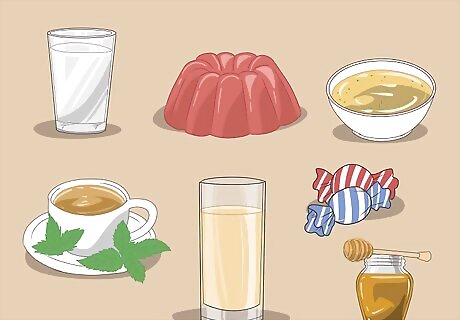
Limit your drinks to clear beverages for the 24 hours before your exam. This is the only type of liquid or food you can consume the day before your colonoscopy. In general, “clear” usually means you see through the beverage. Drink water, unsweetened tea, broth, and clear carbonated drinks. It’s usually okay to drink coffee if you don’t add milk or cream. Don’t consume anything that’s red, blue, or purple, as it can resemble blood. You can typically consume the following: Water Apple juice without pulp Tea or coffee without milk Clear chicken or vegetable broth Soda Clear sports drinks Flavored gelatin Popsicles Hard candy HoneyWarning: Don’t drink any red, blue, or purple juices, even if they look clear. The color can make it look like you have blood in your colon, which can mess up your results.
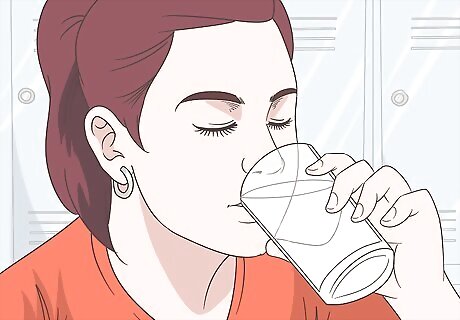
Drink 96 to 120 fl oz (2.8 to 3.5 L) of fluids to prevent dehydration. Since the laxative will make you have diarrhea, you might get dehydrated if you don't drink enough liquids. Filling up on liquids can also minimize hunger pangs and help flush out your system before the test. Consider these ideas for incorporating more liquids into your day: For breakfast, you could have a glass of coffee without milk and a glass of apple juice. During your coffee break, you could have a cup of coffee and a glass of water. Throughout your workday, you could sip on another 2 glasses of water. You could have a glass of sports drink and a glass of clear broth for lunch. As an afternoon snack, you could have clear hard candy, popsicles or jello. For dinner, you might have a glass of tea and a glass of vegetable broth. After dinner, you might relax with a cup of hot tea and a glass of water.
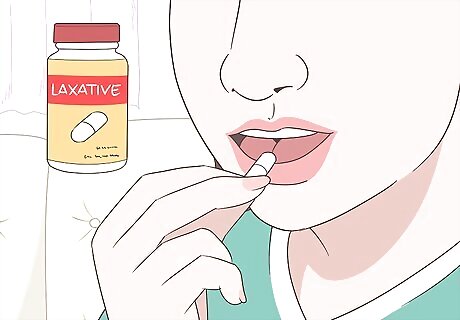
Take a laxative the night before your exam and possibly in the morning. Your doctor will prescribe either a pill or liquid laxative to help you have a bowel movement. Follow the directions included with your laxative. Consume 1 dose the night before your colonoscopy. If your doctor recommends it, take the second dose in the morning before the test. You’ll likely take the first dose of your laxative at 6:00 p.m. on the night before your colonoscopy. If your laxative is in 2 doses, expect to take the second dose on the morning of your exam at least 4 hours before your appointment time. If you're using a liquid laxative, you may be able to improve the taste by adding a packet of Crystal Light or Kool-Aid, as long as it's not red, purple, or blue. Just check with your doctor first.

Wear loose clothes and stay close to a bathroom after taking the laxative. You're likely going to have frequent diarrhea over the span of several hours once the laxative kicks in. Try to make yourself as comfortable as possible by changing into clothes that are loose and easy to remove. Stay home for the evening so you can easily get to the bathroom. Stay in a room that's near your bathroom so you won't have to go far.
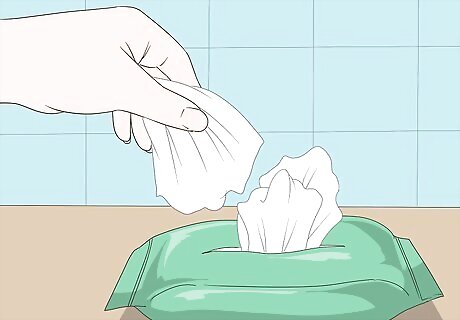
Use wet wipes to clean yourself after diarrhea to avoid skin irritation. While this is optional, wet wipes are a gentler way to clean your anus after a bowel movement. Since you'll be having a lot of diarrhea, you might experience irritation if you use toilet paper. Try wet wipes to see if that's more comfortable for you. Check the label on your wet wipes to see if they're flushable. You may need to throw them in the trash to avoid clogging your toilet pipe. If this is the case, it might help to keep a plastic bag in the bathroom to collect the used wipes.
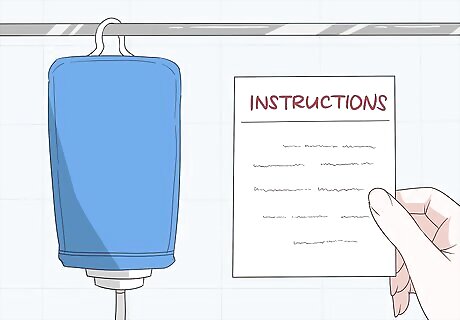
Give yourself an enema if your doctor recommends it. You may not need to do an enema, but your doctor may suggest it to ensure your lower colon is clean. Get an over-the-counter (OTC) enema from your local drug store or online. Follow the instructions in your kit to flush out your colon. Since enemas only clean your lower bowel, they’re not a replacement for the laxative your doctor prescribes.
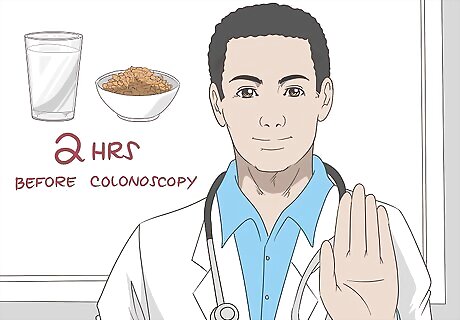
Stop all liquids at least 2 hours before your colonoscopy. Drinking something too close to your exam may affect your results. Check with your doctor to find out exactly when you need to cut off liquids. Your doctor may say it’s safe to sip on clear liquids on the morning of the exam, but sometimes they ask you to avoid liquids after midnight the night before. You should still be avoiding food, as well.












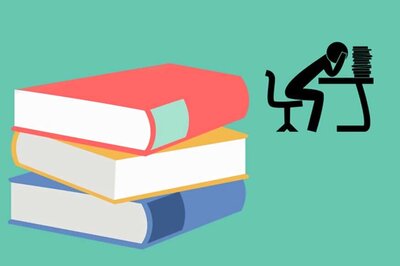
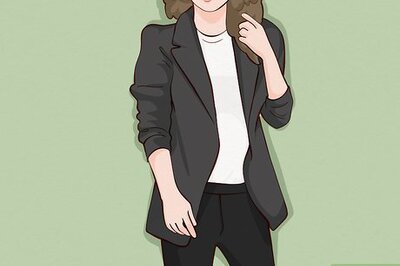


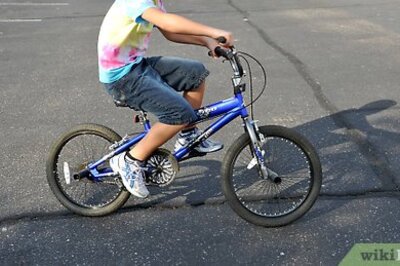
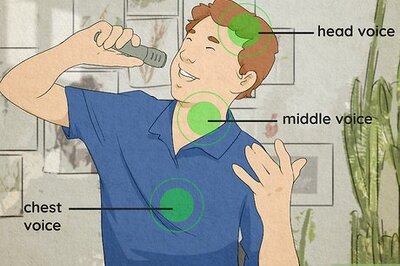

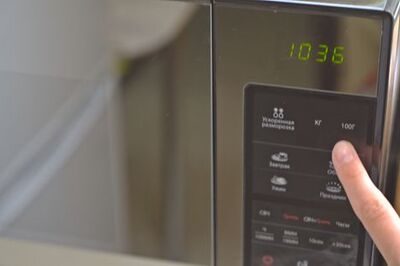
Comments
0 comment